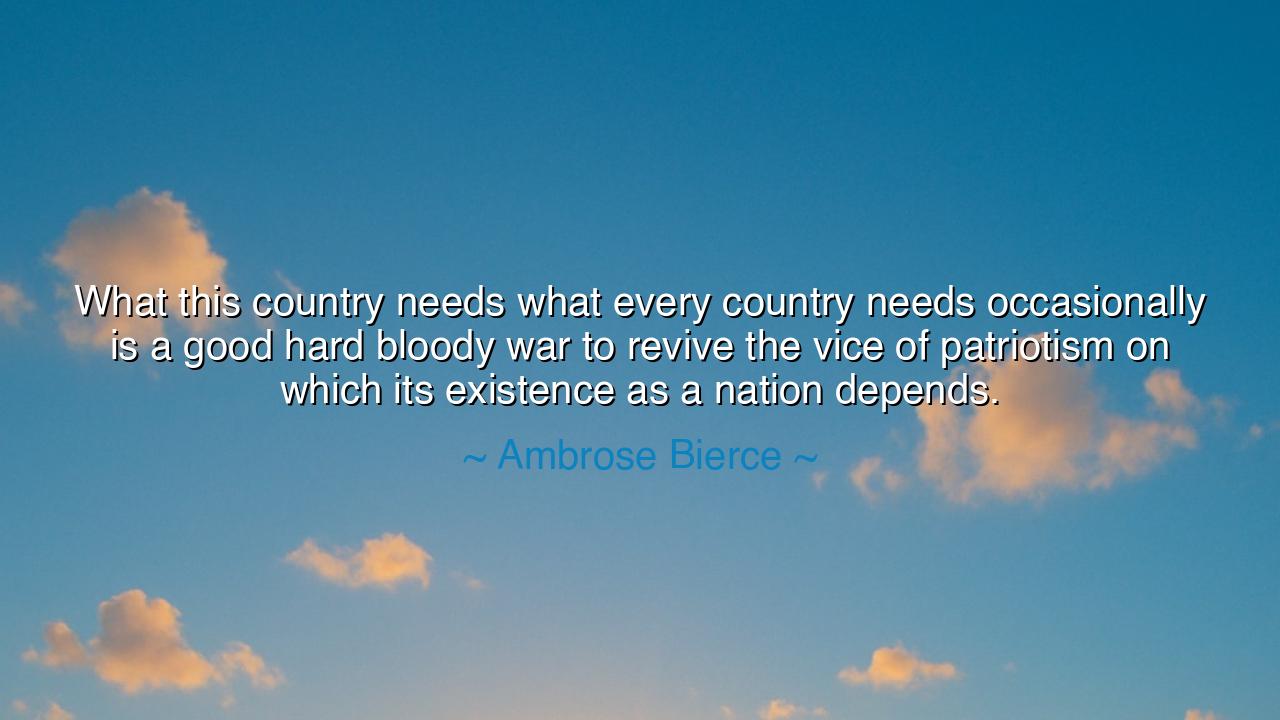
What this country needs what every country needs occasionally is
What this country needs what every country needs occasionally is a good hard bloody war to revive the vice of patriotism on which its existence as a nation depends.






The words of Ambrose Bierce—“What this country needs, what every country needs occasionally, is a good hard bloody war to revive the vice of patriotism on which its existence as a nation depends.”—fall like sparks from the forge of irony, for Bierce was a soldier, a satirist, and a man scarred by war. He had seen with his own eyes the carnage of the American Civil War, and he knew too well that the fever of patriotism could drive men to slaughter as easily as to sacrifice. In this grim utterance, he strips away the illusions of glory and exposes the darker truth: that nations often require the terrible crucible of war to awaken the dormant passions that hold them together.
At the heart of his statement lies a paradox. Bierce calls patriotism a vice, not a virtue, for he recognized how easily it could be manipulated by leaders to bind men to banners, to inspire sacrifice without question, and to sanctify destruction. Yet, he acknowledges that this very vice often becomes the glue of nations. When citizens grow complacent, when selfishness replaces unity, it is often war that shocks them back into a sense of shared destiny. Thus, Bierce speaks both as cynic and prophet, laying bare the uneasy truth that patriotism thrives most fiercely when threatened by blood and fire.
History gives us grim testimony to this. Before the Civil War, the United States was a union in name but fractured in soul. It was the “good hard bloody war” that Bierce himself fought in that forged a new, though painful, definition of American unity. More than 600,000 lives were lost, yet from that furnace came the abolition of slavery and the rebirth of the nation. Patriotism, though stained with blood, was reborn as a devotion to union and liberty rather than merely to state or region. In this way, Bierce’s irony conceals a truth: sometimes nations rediscover themselves only through trial.
We may look too to the Great Wars of the 20th century. Before 1914, Europe was a patchwork of rivalries and complacent empires. The First World War, catastrophic though it was, reignited fierce patriotism, calling entire populations into sacrifice and service. Factories were transformed, women entered the workforce in droves, and nations bled themselves white for the sake of their flags. In the Second World War, the very survival of nations depended on the rekindling of unity. Though Bierce’s words drip with sarcasm, they remind us that war, dreadful as it is, has often been the crucible in which national identity has been reforged.
And yet, Bierce’s wisdom is double-edged. He does not glorify war; he condemns it. By calling patriotism a vice, he unmasks its danger. For if nations depend upon war to maintain their unity, then their foundation is built not on justice, peace, or virtue, but on blood. The patriotism born of fear and violence is powerful, but it is also perilous, for it teaches people to unite only when threatened, and to love their nation only in the face of the enemy. Such patriotism burns brightly, but it consumes as much as it creates.
The lesson for us, children of a later age, is clear: let us not wait for war to awaken our devotion to the nation. Let us kindle a patriotism of peace, born not of hatred for enemies, but of love for one another. If war can unite, then peace can unite more deeply—through justice, service, and the pursuit of shared dreams. Bierce’s words, though bitter, are a warning: do not let the nation grow so complacent that only war can remind it of its soul.
In daily life, this means nurturing unity in times of peace—serving one’s community, honoring the sacrifices of the past, and working for the common good without waiting for crisis. It means teaching children to love their country not only as a fortress to be defended, but as a garden to be cultivated. It means channeling the fervor of patriotism into acts of creation rather than destruction, into building schools and hospitals instead of trenches and graves.
Thus let us hear Bierce not as a commander calling for war, but as a prophet warning us: if patriotism can only be revived by blood, then it is a fragile and dangerous thing. Let us instead forge a higher patriotism, one that does not need war to awaken it, but flourishes in peace, justice, and the shared work of building a future together. For the truest nation is not held together by the fear of enemies, but by the love of its own people.






AAdministratorAdministrator
Welcome, honored guests. Please leave a comment, we will respond soon